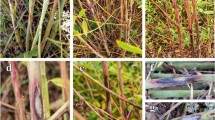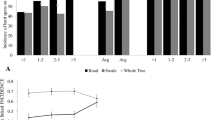Abstract
IN September 1954 a die-back disease was seen on cacao seedlings growing in Agricultural Department nurseries established in various localities of the western region of Nigeria. There is no previous record of this disease in Nigeria, but it has reappeared in the nurseries in subsequent years. The disease caused considerable losses in these years, and in a particular nursery as many as 70 per cent of the young seedlings were killed. A species of Phytophthora has been established as the causal agent, and when inoculated into healthy cacao pods the symptoms produced were identical to those of black-pod disease caused by Phytophthora palmivora (Butl.) Butl.
This is a preview of subscription content, access via your institution
Access options
Subscribe to this journal
Receive 51 print issues and online access
$199.00 per year
only $3.90 per issue
Buy this article
- Purchase on Springer Link
- Instant access to full article PDF
Prices may be subject to local taxes which are calculated during checkout
Similar content being viewed by others
References
Orellana, R. G., Tenth Ann. Rep. Inter-American Institute of Agricultural Sciences, Turrialba, Costa Rica, 1952 (1953).
Van Suchtelen, N. J., Surinaam Landb., 3, 3, 223 (1955).
Thorold, C. A., Nature, 170, 718 (1952).
Author information
Authors and Affiliations
Rights and permissions
About this article
Cite this article
CHANT, S. A Die-back of Cacao Seedlings in Nigeria caused by a Species of Phytophthora . Nature 180, 1494–1495 (1957). https://doi.org/10.1038/1801494b0
Issue Date:
DOI: https://doi.org/10.1038/1801494b0
Comments
By submitting a comment you agree to abide by our Terms and Community Guidelines. If you find something abusive or that does not comply with our terms or guidelines please flag it as inappropriate.



